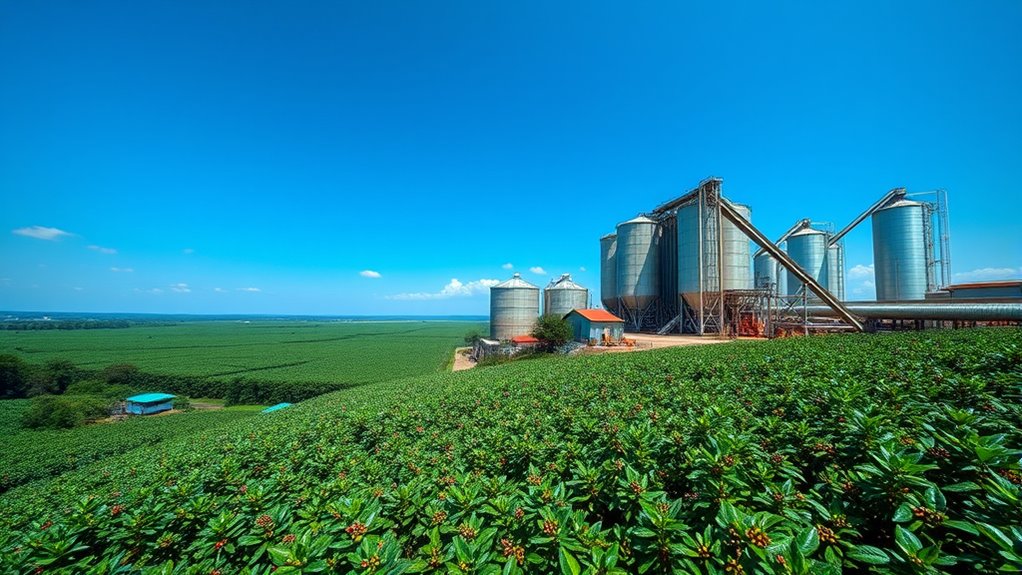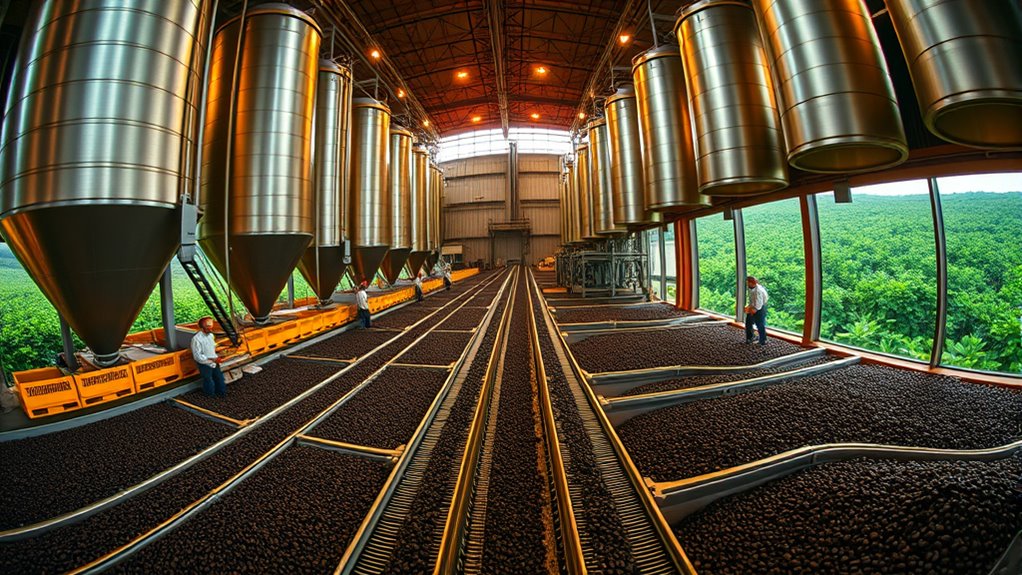Brazilian coffee is the world’s largest industry, with exports exceeding 50 million bags annually. You’ll find it grown across diverse regions like Minas Gerais, São Paulo, and Bahia, each offering unique flavors due to the favorable climate and rich soils. The country’s focus on sustainable practices, innovation, and quality control helps maintain a high standard worldwide. If you want to discover more about Brazil’s vibrant coffee culture and global influence, keep exploring what makes it so special.
Key Takeaways
- Brazil leads global coffee exports with diverse regions producing high-quality beans reflecting unique flavor profiles.
- Favorable climate, rich soils, and advanced cultivation techniques ensure consistent, premium coffee production.
- Extensive infrastructure and trade networks facilitate efficient export to worldwide markets, maintaining top quality.
- Regional diversity offers a wide variety of coffee flavors, from light to dark roasts, appealing to global consumers.
- Heavy investment in innovation and sustainability practices supports Brazil’s position as the world’s largest coffee industry.

Have you ever wondered what makes Brazilian coffee so renowned worldwide? It all begins with the country’s extensive coffee cultivation. Brazil’s climate, rich soil, and diverse terrain create ideal conditions for growing high-quality coffee beans. The nation’s farmers have perfected their cultivation techniques over decades, ensuring that beans develop the perfect balance of flavor, aroma, and body. From the lush plantations in Minas Gerais to the sprawling farms in São Paulo and Bahia, each region offers unique tastes, reflecting Brazil’s vast agricultural diversity. This dedication to quality in coffee cultivation has helped Brazil maintain its position as a global leader in the coffee industry.
Brazil’s diverse regions cultivate unique, high-quality coffee beans, sustaining its global leadership in the coffee industry.
As you explore the world of Brazilian coffee, you’ll notice that the country’s influence extends far beyond its borders through its robust export markets. Brazil exports millions of bags of coffee each year, making it the world’s largest coffee exporter. This massive supply chain supports not only international coffee shops and roasters but also local economies that depend heavily on coffee exports. The country’s ability to produce such a large volume of beans while maintaining consistent quality is a key factor behind its success in global markets. Whether it’s the milder Arabica beans from mountainous regions or the more robust Robusta varieties cultivated in warmer lowlands, Brazil’s diverse offerings cater to every taste preference.
The export markets for Brazilian coffee are highly strategic and well-established. The country has long-standing trade relationships with countries across North America, Europe, and Asia. These markets rely heavily on Brazilian coffee for their daily consumption, often favoring the smooth, balanced flavor profiles that Brazil’s beans are known for. The country’s efficient logistics infrastructure, including ports and transportation networks, ensures that coffee reaches these markets swiftly and in top condition. Additionally, Brazil’s reputation for sustainable and environmentally friendly farming practices adds value to its coffee exports, appealing to increasingly conscious consumers worldwide. Furthermore, Brazil invests in sustainable farming practices to ensure long-term productivity and environmental health. This focus on sustainability also enhances the quality control processes that ensure every batch meets international standards.
You also benefit from Brazil’s focus on innovation and quality control. As the largest coffee producer, Brazil invests heavily in research and development, improving cultivation methods and processing techniques. This commitment results in beans that meet the high standards demanded by international buyers. Furthermore, Brazil’s ability to scale production without sacrificing quality means you can always find a consistent supply of fresh, flavorful coffee. Whether you prefer a light roast from the southeastern regions or a bold dark roast from the interior, Brazil’s diverse export markets ensure that you have access to a wide array of choices.
Frequently Asked Questions
How Does Brazil Ensure Sustainable Coffee Farming Practices?
You can see that Brazil promotes sustainable coffee farming by encouraging organic certification, which reduces chemical use and benefits the environment. They also focus on water conservation, implementing practices like efficient irrigation and rainwater harvesting to minimize water waste. These efforts help protect ecosystems and ensure long-term coffee production. By supporting farms with sustainable certifications, you contribute to environmentally friendly practices and a healthier coffee industry.
What Are the Main Challenges Faced by Brazilian Coffee Producers Today?
Imagine you’re steering a stormy sea, where labor shortages and price volatility act as unpredictable waves. You face the challenge of keeping your vessel steady amid rising costs and difficulty finding enough crew. These issues threaten your ability to produce quality coffee efficiently. As a producer, you must adapt quickly, balancing economic pressures while ensuring sustainability, all while steering through these turbulent waters towards calmer shores.
How Has Climate Change Impacted Brazil’S Coffee Industry?
You’ve seen how climate change impacts Brazil’s coffee industry by causing unpredictable weather patterns and droughts. To stay resilient, farmers focus on climate adaptation strategies, such as diversifying crops and improving water management. Building drought resilience becomes vital in these times, ensuring coffee production continues despite environmental challenges. These efforts help safeguard Brazil’s position as a global coffee leader while protecting local communities and ecosystems.
What Innovations Are Driving Brazil’s Coffee Processing Techniques?
They say “necessity is the mother of invention,” and in Brazil’s coffee industry, technological advancements lead the way. You’ll find innovations like precision harvesting and advanced quality control systems that guarantee superior beans. These techniques boost efficiency, reduce waste, and improve product consistency. By embracing these innovations, Brazil keeps its coffee industry competitive and sustainable, proving that progress is essential to meet global demand and maintain quality standards.
How Do Brazilian Coffee Varieties Differ From Other Global Types?
You’ll find Brazilian coffee varieties offer unique flavor profiles, thanks to diverse growing regions and harvesting methods. These varieties often have a balanced acidity, rich aroma, and smooth body that set them apart from other global types. Brazilian farmers prioritize selective harvesting techniques, ensuring only ripe cherries are picked, which enhances flavor quality. This focus on precise harvesting methods contributes profoundly to the distinctive taste and consistency of Brazilian coffees.
Conclusion
You might not realize it, but Brazil produces about 40% of the world’s coffee, making it the largest coffee industry globally. This means every time you sip your morning brew, there’s a good chance it comes from Brazil’s vast plantations. Their dedication and scale keep the world caffeinated and energized. So next time you enjoy your coffee, remember you’re part of a global community fueled by Brazil’s incredible coffee industry.









